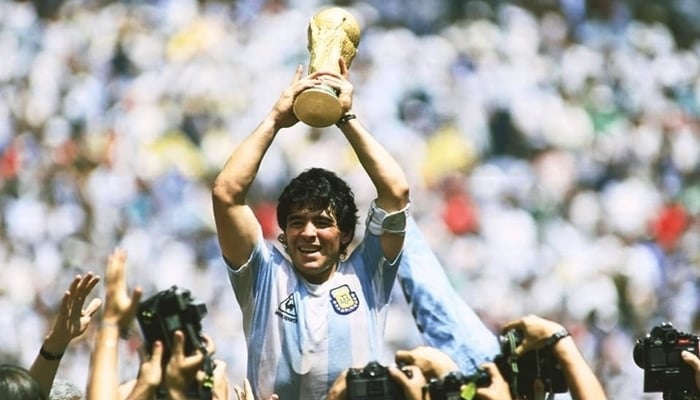A short tribute to Diego Maradona, a Latin American legend who died today, leaving an impact all over, including Central America.
I struggled for about 30 seconds before deciding this was a relevant subject to write about on this website about Central America.
After all, Central America is part of Latin America, and Diego Maradona was Latin America in a nutshell.
He epitomized Latin America, or at least an idea of Latin America that attracts many of us cold-blooded non-Latinos from the north.
Wild, proud, passionate, spontaneous, a little crazy, a little dangerous. Heart before head instead of head before heart. Rebellious. Flawed. Mercurial.
Rest in peace Diego Maradona, the most rock’n’roll footballer ever to do it https://t.co/VPNtYvopPX
— NME (@NME) November 25, 2020
Maradona might have been Argentinean, but make no mistake; Latin Americans from Tijuana to Tierra del Fuego took him in as one of their own. And that includes Central America.
I’ve seen that in the 20 years I’ve been here. I’ve chatted football with Costa Ricans, Panamanians, Nicaraguans, and others. Football is the biggest ice-breaker in the world, after all. If you can talk to a stranger about football, you’ll never be lonely. And if you can talk to a stranger about Maradona and agree that he’s the GOAT, you’ll get drinks bought for you. Everyone was passionate about Maradona in Central America.
I’ve debated the Hand of God goal in cantinas and beach bars all over Central America. And again, everyone, even non-Argentineans, saw that as a well-deserved poke in the eye to an arrogant colonial power. No sympathy anywhere for this England supporter.
When I first came to Latin America, I admit that bothered me.
People felt genuine glee over Maradona tapping in that goal with his hand in 1986, even if they were too young to remember it.
They still feel glee, because in that moment, when Maradona’s hand delivered that blow to England’s World Cup 86 hopes, it wasn’t only a goal. It was more than that.
As the @FIFAWorldCup 2018 starts, the https://t.co/b3a29TBo44 editor (an England supporter) talks about his life of World Cups, about being sucked in again and about how Costa Rica has made him enjoy it more.https://t.co/L9o4L0dCtv#WorldCupRussia2018 pic.twitter.com/HqPdgJdI8Z
— CentralAmericaLiving (@VidaAmerica) June 14, 2018
Because he scored with his hand, that goal became iconic. Europeans had cheated Latin America for centuries. Latin America got one back that day, and the English protests and cries of cheat only made it sweeter.
It took years for me to understand that. But once I did, I saw why Maradona became the cultural icon throughout Latin America that he was. It was more than talent, it was pride and revenge. That’s what Maradona brought to Argentina and the wider Latin world.
Maradona was far more than one goal, though.
First off, after that goal in that game came another one a few minutes later. A goal that started in his own half and saw Maradona dribble the ball past five England players, leaving them in the dust before tricking goalkeeper Peter Shilton into falling on his backside and smoothly slotting the ball home.
I remember watching that goal dumbfounded as a kid. To this day, no player anywhere has scored a better goal. I dare you to show me a better goal.
I think I speak for most England fans when I say we don’t care about the Hand of God, or getting knocked out. Because it meant the world saw this, the greatest goal ever scored. #Maradona pic.twitter.com/I7jUTwI9eO
— Jamie Bartlett ???? (@JamieJBartlett) November 25, 2020
But forget goals and England. Let’s get beyond that. Maradona was a man of the people, pan-Latino, always fighting the system. Always advocating for Latin America.
I remember the 2018 World Cup, when FIFA sanctioned him for saying Colombia were robbed in their second-round match against (again) England.
He ranted and raged against England and FIFA, insinuating corruption at the highest levels. FIFA were furious, but that was Maradona all over – advocating for the Latin American underdog, taking it to the system. And not caring about pissing off the powers-that-be.
These are the reasons why Latin America adores Maradona, and mourns today. He had his talent but it was his zest that people love. In Central America you see Argentina shirts all over the place and it’s not just because of Messi.
La Vida Tombola by Manu Chau could be my favorite football song ever, heck one of my favorite songs ever.
The lyrics sound and work much better in Spanish, but in the song, Manu Chau wistfully muses on how it would be if he himself was Maradona.
“If I was Maradona, I’d live like him,” he sings. “A thousand rockets, a thousand friends…”
It’s not uncommon for people to wish they were Maradona, at least for a few minutes. Even if you’re a successful musician like Manu Chau. There was a time when everyone wanted to be Maradona or imagined they were him.
As I write this, I hear Scottish football pundit Pat Nevin on BBC radio talking about watching him and, yes, wishing he was Maradona.
La vida es una tombola…
RIP the #HandofGod legend that was and ever will be #DiegoMaradonahttps://t.co/OgVQDoGL5pBuen viaje #pelusa! pic.twitter.com/LEtGIRR0pd
— LatAmTravelist (@LatAmTravelist) November 25, 2020
If you were Maradona, you were a genius who could break the rules. You could live how you want and be untouchable.
There’s something very appealing about that if you come from nothing like he did. You know, from grinding poverty where your opinion doesn’t count, like so many in Latin America.
I’ll leave it to others to talk about his skills on the pitch or his career. They can talk about Napoli and why the people of that city are out on the streets tonight. They can dig deeper into Argentina and the football pride he brought back to the country after years of repression and dictatorship.
Remembering Diego Maradona: football legend dies aged 60 – video obituary https://t.co/xH3Xmc3Yn7
— The Guardian (@guardian) November 25, 2020
He’s certainly the greatest player of all time, but that’s not what I’m trying to express here. Other people can also assess the psyche of the man and his state of mind.
I only wanted to say a few words about his impact on Latin American and the Latin American psyche.
Like all flawed heroes, there was a deep sadness about Maradona.
One can’t help but feel he needed more help to cope with his life than he ever received. Most of his errors were his own, with no-one to blame but himself. But it can’t have been easy living with the hopes and dreams of a country, a region on your shoulders.
His death reminds me of George Best’s (a hero of Maradona’s who, by coincidence, died on this same day 15 years ago), George Michael’s, and Anthony Bourdain’s. These celebrity deaths all hit me hard, I admit it. I guess it was the individual flaws in these people I can identify with, how they all went out unhappy. I hope Maradona found his happiness before he died.
Rest in peace, pibe de oro. You brought pleasure and pride to millions, including this England supporter.
James Dyde is the editor of www.centralamerica.com. He lives in Escazu, Costa Rica.




